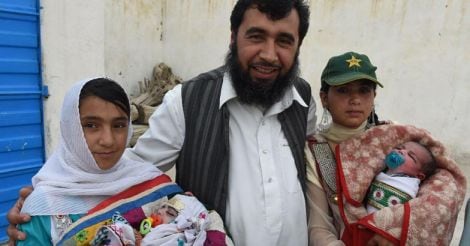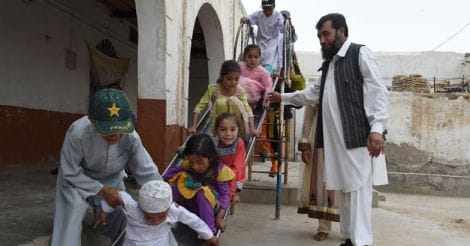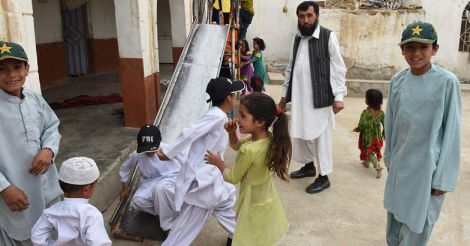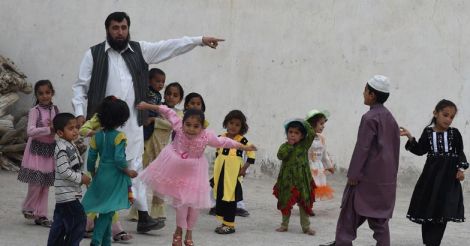Quetta: A Pakistani father of 35 is now searching for a fourth wife as he romps towards his goal of 100 children, a dubious ambition in the conservative Muslim country where polygamy is rare but still practiced.
Sardar Jan Mohammad Khilji, 46, says he believes it is his religious duty to have as many children as possible.
Insisting it is "very rare" that he mixes up his children's names, the medical technician said he juggles their affections by taking turns to attend family events with them and their mothers, such as weddings.
His three current wives support his procreational and matrimonial goals, he said, adding that they all live in harmony together – though he would not allow AFP to speak with them.
 Pakistani father Sardar Haji Jan Mohammad Khilji poses with some of his children at his residence in Quetta. Photo: AFP
Pakistani father Sardar Haji Jan Mohammad Khilji poses with some of his children at his residence in Quetta. Photo: AFPRights activists warn it is women and children who suffer most in polygamous marriages.
Pakistani men are permitted to take up to four wives under Islam, though to do so they must seek permission from their first wife and an arbitration council.
It remains rare for men to take multiple wives in the country, but when polygamy does take place, studies have shown it can result in "depression and despair" among wives, while children often struggle to know their father, said Rafia Zakaria, a women's rights activist.
 Pakistani father Sardar Haji Jan Mohammad Khilji plays with some of his children at his residence in Quetta. Photo: AFP
Pakistani father Sardar Haji Jan Mohammad Khilji plays with some of his children at his residence in Quetta. Photo: AFPThe Quran, she told AFP, dictates that multiple wives may be taken only when a husband can do "perfect justice" among them.
"Well, perfect justice is impossible, and for this reason polygamy is never a good situation," said Zakaria, who campaigns against the practice.
"Someone always suffers and almost always it is the women and children," she added.
Family lawyer Mohammed Bilal Kasi, who deals with polygamy cases in Quetta agreed.
"We lawyers are well aware of social problems surrounding polygamy," he said. "Women and children undergo mental agony due to these affairs."
 Pakistani father Sardar Haji Jan Mohammad Khilji plays with some of his children at his residence in Quetta. Photo: AFP
Pakistani father Sardar Haji Jan Mohammad Khilji plays with some of his children at his residence in Quetta. Photo: AFPThe tension can lead to serious legal disputes over property and rights after the father's death, he said.
Denied his permission to speak, Jan's wives could not describe what life is like for his sprawling dynasty, who all live together in a five-bedroom mud hut in the outskirts of Quetta in restive Balochistan province.
At least two of his children appear to support his goals, however, including his eldest child Shagufta Nasreen.
"A large family is like Allah bestowing a case of mangoes," the 15-year-old explained, adding that she hopes to go into medicine like her father.
(With inputs from agencies)
























 Pakistani father Sardar Haji Jan Mohammad Khilji plays with some of his children at his residence in Quetta. Photo: AFP
Pakistani father Sardar Haji Jan Mohammad Khilji plays with some of his children at his residence in Quetta. Photo: AFP